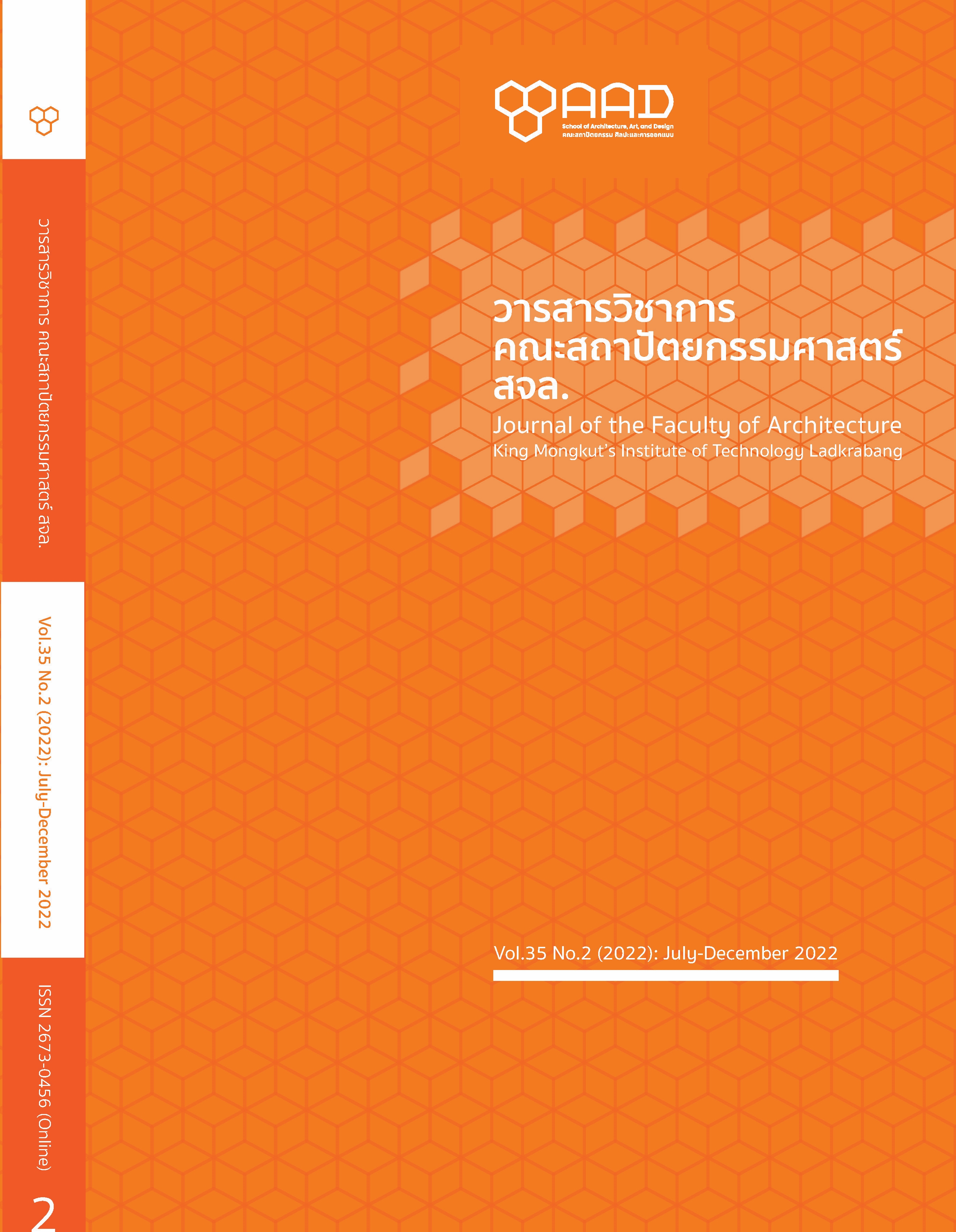Transformation Process of Local Study by the Youths for Engaging in Urban Development
Main Article Content
Abstract
This paper focuses on the transformation process of local study by youths, the active citizens participating in city development in the future. It aims to result the formation of processes and new local study prototypes in an integrated education system and upgrading Chiang Mai learning city from youth participation and cooperation mechanism for urban development through lifelong learning by collecting city data and resources as Chiang Mai local studies. The lesson learned result performed the key issues of transforming learning city integration for youths which is affected urban development such as; (1) the diverse communication and easy accessibility, (2) prepared correctly lessons and appropriated for the age of learners, and (3) do not block everyone's learning opportunities through connecting the local information and city network, especially educational institutions under a potential platform. In sum, there will lead to upgrading Chiang Mai learning city from the youth participation process and the cooperation mechanism for urban development towards lifelong learning.
Article Details

This work is licensed under a Creative Commons Attribution-NonCommercial-NoDerivatives 4.0 International License.
This work is licensed under a Creative Commons Attribution-NonCommercial-ShareAlike 4.0 International License.
Copyright Transfer Statement
The copyright of this article is transferred to Journal of The Faculty of Architecture King Mongkut's Institute of Technology Ladkrabang with effect if and when the article is accepted for publication. The copyright transfer covers the exclusive right to reproduce and distribute the article, including reprints, translations, photographic reproductions, electronic form (offline, online) or any other reproductions of similar nature.
The author warrants that this contribution is original and that he/she has full power to make this grant. The author signs for and accepts responsibility for releasing this material on behalf of any and all co-authors.
References
กรมการปกครอง กระทรวงมหาดไทย. (2564). จำนวนประชากรกลางปี 2564 จังหวัดเชียงใหม่ แยกชายหญิง รายอายุ รายอำเภอ. เข้าถึงได้จาก: https://www.chiangmaihealth.go.th/cmpho_web/detail_article2.php?info_id=670.
เครือข่ายนักผังเมืองเชียงใหม่. (2553). รายงานขั้นสุดท้ายของการปฏิบัติการเชียงใหม่เอี่ยม. กรุงเทพฯ: สำนักงานกองทุนสนับสนุนการสร้างเสริมสุขภาพ (สสส.).
จิรันธนิน กิติกา. (2560). โครงข่ายชุมชนบนการวางผังเมืองสมัยใหม่ จากการศึกษาเชิงเปรียบระหว่าง ชุมชนโคยยามะ จังหวัดเกียวโต และชุมชนบนถนนนิมมานเหมินทร์ จังหวัดเชียงใหม่. วารสารวิชาการคณะสถาปัตยกรรมศาสตร์ สจล. 25(2), 24-36.
ชิษณุพงศ์ ด้วงสุข และปริลักษณ์ กลิ่นช้าง (2563). อำนาจละมุน (Soft Power) ที่สะท้อนในภาพยนตร์เยอรมัน Good Bye, Lenin!: การใช้มุมมองทางรัฐศาสตร์วิเคราะห์ภาษาและสัญลักษณ์ในภาพยนตร์. วารสารมนุษยศาสตร์. ฉบับบัณฑิตศึกษา, 53-75.
ผุสดี กลิ่นเกษร. (2562). การเรียนรู้ตลอดชีวิตกับการพัฒนาทักษะชีวิต. ในการประชุมวิชาการระดับชาติและนานาชาติ มหาวิทยาลัยศรีประทุม ครั้งที่ 14 (หน้า 1440-1447). กรุงเทพฯ: มหาวิทยาลัยศรีปทุม.
วิถี พานิชพันธุ์. (6 กรกฎาคม 2564). สัมภาษณ์โดย อัมพิกา ชุมมัธยา. พัฒนาการเมืองเชียงใหม่ อดีต-ปัจจุบัน ในความทรงจำ. ผู้เชี่ยวชาญด้านศิลปวัฒนธรรมล้านนา และผู้ร่วมก่อตั้งคณะวิจิตรศิลป์ มหาวิทยาลัยเชียงใหม่.
วิทยา ดวงธิมา และปรานอม ตันสุขานันท์. (2561). แนวทางการพัฒนาละแวกบ้านและย่านในเมืองเชียงใหม่.
วารสารวิชาการคณะสถาปัตยกรรมศาสตร์ สจล. 2(1), 134-151.
วรลัญจก์ บุณยสุรัตน์ (7 กรกฎาคม 2564). สัมภาษณ์โดย อัมพิกา ชุมมัธยา. พัฒนาการเมืองเชียงใหม่ อดีต-ปัจจุบัน ในความทรงจำ. ผู้เชี่ยวชาญด้านศิลปวัฒนธรรมล้านนา และผู้อำนวยการสถาบันวิจัยสังคมศาสตร์ มหาวิทยาลัยเชียงใหม่.
สันติภาพ รอดสถิตย์. (2559). ปัจจัยการส่งเสริมการเรียนรู้ตลอดชีวิตในชุมชนเมืองโดยใช้ความร่วมมือระหว่างบ้านวัดโรงเรียน. วารสารอิเล็กทรอนิกส์ทางการศึกษา, 11(4), 542-555.
สายกลาง จินดาสุ. (6 กรกฎาคม 2564). สัมภาษณ์โดย อัมพิกา ชุมมัธยา. พัฒนาการเมืองเชียงใหม่ อดีต-ปัจจุบัน ในความทรงจำ. นักโบราณคดีปฏิบัติการ กรมศิลปากรที่ 8 เชียงใหม่.
สำนักงานนวัตกรรมแห่งชาติ. (2562). ย่านนวัตกรรมกรุงเทพ. กรุงเทพฯ: สำนักงานนวัตกรรมแห่งชาติ.
อัมพิกา ชุมมัธยา และณวิทย์ อ่องแสวงชัย. (2561). การขยายตัวของเมืองกับการเปลี่ยนแปลงบริบทของย่านเมืองเก่าในจังหวัดเชียงใหม่. วารสารวิชาการ การออกแบบสภาพแวดล้อม. 5(1), 60-81.
อัมพิกา ชุมมัธยา และชาญณรงค์ ศรีสุวรรณ. (2562). การถอดบทเรียนจากกิจกรรมสัมมนาเชิงปฏิบัติการแบบมีส่วนร่วมสู่กระบวนทัศน์ใหม่ในการปรับปรุงฟื้นฟูเมืองเชียงใหม่. วารสารการบริหารท้องถิ่น. 12(2), 216-232.
อานนท์ พรหมศิริ. (2563). แผนการจัดการเรียนรู้รายวิชาการศาสตร์กับการออกแบบภายในเพื่อให้สอดคล้องกับวิถีความปกติรูปแบบใหม่หลังยุคโควิด-19. กรุงเทพฯ: มหาวิทยาลัยราชภัฎพระนคร.
อิสรา กันแตง (7 กรกฎาคม 2564). สัมภาษณ์โดย อัมพิกา ชุมมัธยา. พัฒนาการเมืองเชียงใหม่ อดีต-ปัจจุบัน ในความทรงจำ. ผู้เชี่ยวชาญด้านสถาปัตยกรรมผังเมือง และอาจารย์ มหาวิทยาลัยเทคโนโลยีราชมงคลล้านนา.
Chaiyasut, K. (2015). Evaluation model for teachers’ roles to promote lifelong learning skills of students at the basic education level. (Doctoral dissertation, Chiang Mai: Chiang Mai University).
Dave, R. H. (1973). Lifelong education and school curriculum. Hamburg: UNESCO Institute for Education.
Lefebvre, H. (1991). The production of space. Oxford: Wiley-Blackwell.
Tuama, S. O. (2020). Learning neighbourhoods: lifelong learning, community and sustainability in cork learning city. Studies in Adult Education and Learning. 26(1), 53-65.
UNESCO Institute for Lifelong Learning. (2019). What is the UNESCO Global Network of Learning Cities (GNLC)?. Retrieved from: https://uil.unesco.org/lifelong-learning/learning-cities.
UNESCO Institute for Lifelong Learning. (2019). Member of the UNESCO Global network of learning cities. Retrieved from: https://uil.unesco.org/lifelong-learning/learning-cities/members.
Woodcock, M.P. and Francis, L.D. (1994). Organization development through team building. Hauts: Gower.


